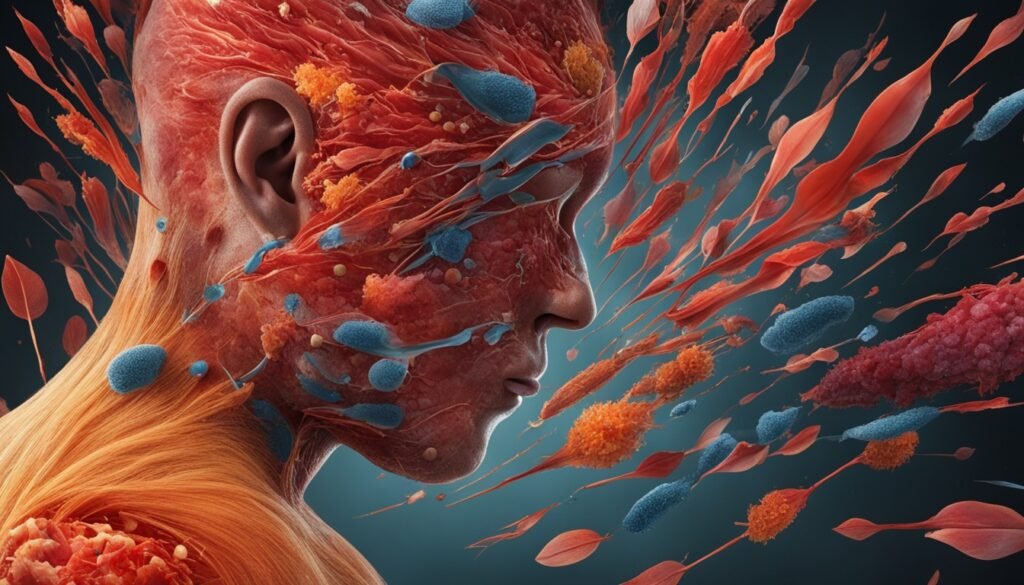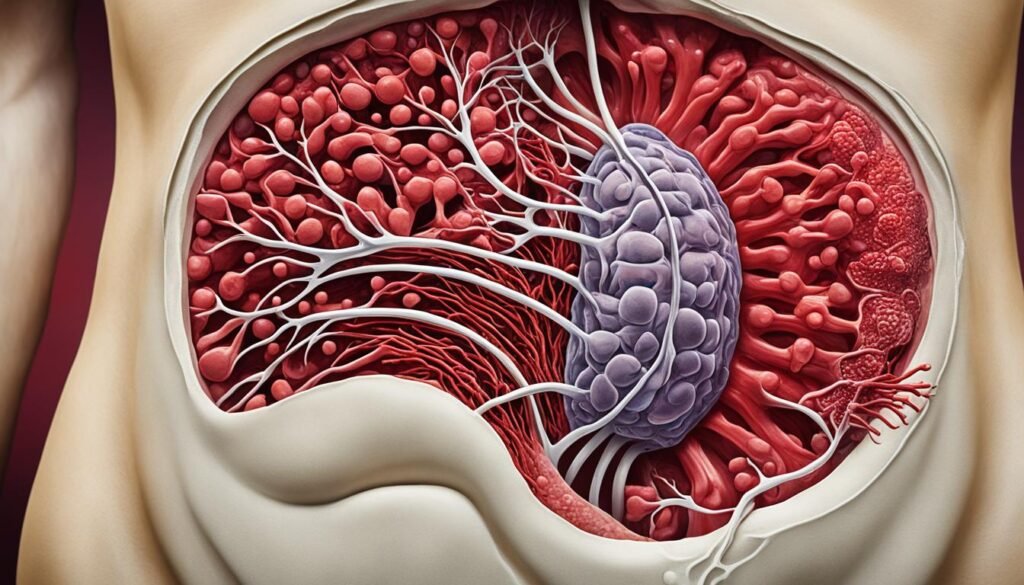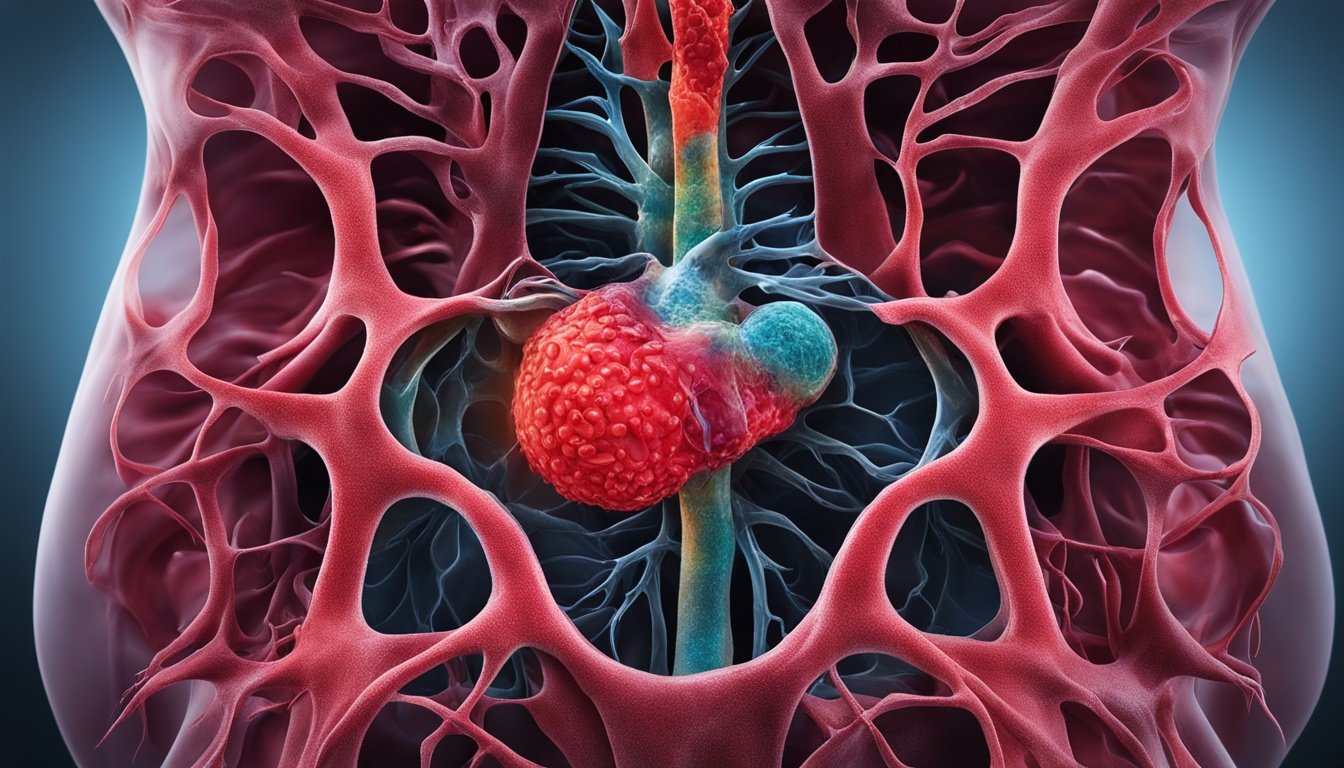Leaky gut syndrome is a problem many face without knowing it. It leads to various health issues. These can include digestive troubles, skin problems, chronic fatigue, and more.
The issue starts when the gut lining breaks down. Then, undigested food, toxins, and bad bacteria can sneak into our bloodstream.1 This can cause inflammation and other health problems.
Many symptoms are linked to leaky gut, like constipation, diarrhea, and fatigue. It can also cause headaches, joint pain, and mental health issues.1 The risk of autoimmune diseases, hormonal problems, and lacking nutrients goes up too.
Several things can lead to leaky gut. These include bad diet, too much alcohol, infections, and stress.1 Gluten might make the gut lining leak more, studies suggest. This adds to the problem.
Our world today has lots of things that could worsen leaky gut. Every day, we’re around over 80,000 chemicals and toxins.1 Some examples are antibiotics and pesticides. These can harm our gut lining, leading to leaky gut.
Key Takeaways
- Leaky gut lets bad things into the blood through the gut lining.
- It can cause many health issues, from digestive problems to fatigue.
- What you eat and your lifestyle can increase leaky gut’s risk.
- Eating right, managing stress, and avoiding certain foods can help heal leaky gut.
- ION* Gut Support and similar supplements may help by making the gut lining stronger.
What is Leaky Gut Syndrome?
Leaky gut syndrome means the gut lining has weak spots. This lets undigested food, toxins, and germs into the bloodstream. This issue can cause inflammation and many health problems, like digestive issues and autoimmune diseases.2
Understanding Intestinal Permeability
Intestinal permeability is part of many digestive and autoimmune diseases. Examples include inflammatory bowel disease and celiac disease.2 The main causes of this are not easy to pin down. There are many complex reasons that lead to this problem.3
The Role of the Gut Barrier
The gut barrier protects us by letting good things in and keeping dangerous stuff out.2 However, when this protection weakens, it can cause various health conditions.2
Things like poor barrier function and gut lining damage lead to leaky gut. Diseases such as celiac and Crohn’s can make it worse.3 But some main reasons for leaky gut are not clear yet. These might be reactions to certain medicines, radiation, or food allergies.3
It’s very important for anyone facing leaky gut symptoms to get help from healthcare experts who listen to them. Working with doctors who look into the real problem is key.3 They might need to do a lot of tests and come up with a unique plan to help heal the gut barrier.3
leaky gut symptoms
Leaky gut syndrome causes symptoms like tummy troubles, tiredness, and trouble with certain foods.2 Learning about these signs helps us fight the problem and boosts our gut’s health.
Digestive Issues and Bloating
Leaky gut often shows up with ongoing tummy problems like bloating, gas, and pain.2 When the gut’s barrier is weak, things like undigested food and germs can enter the body. This leads to inflammation and messes up digestion.
Fatigue and Brain Fog
Many folks with leaky gut feel tired a lot and find it hard to think.2 This happens because their body is busy fighting that gut inflammation. As a result, there’s not much energy left for brain power or staying awake.
Food Sensitivities and Intolerances
Having a leaky gut might make you feel bad after eating certain foods.2 Food and germs that should stay in the gut can get into the body. The immune system reacts, causing issues like bloating, pain, and skin problems.
The Link Between Leaky Gut and Inflammation
Leaky gut is close to chronic inflammation. When stuff like food and toxins pass the gut’s barrier, they set off the body’s defense. This can lead to ongoing inflammation and bring on health issues, even autoimmune diseases.2
Chronic Inflammation and Autoimmune Disorders
Chronic inflammation leads to 60% of deaths worldwide.4 It usually connects with leaky gut, caused by factors like poor diet and illness. Having too many inflammatory markers can up your leaky gut risk.4 Some patients with chronic disorders show harm to their gut barrier that can’t be fixed.4
The connection between leaky gut and autoimmune diseases is clear. If the gut can’t block out harmful stuff, it gets into your blood. Then, your immune system might attack your body, causing problems like arthritis and diabetes.
Fixing leaky gut could help avoid autoimmune illnesses. It’s about working on the gut and calming the body’s inflammation. This could boost your health and keep you well.
Nutrient Deficiencies and Malabsorption
Leaky gut can cause problems with absorbing vitamins and minerals. This is because the gut’s barrier is not working well.5 It affects our health a lot. It leads to many symptoms and makes the chance of getting sick worse.
The Impact on Overall Health
Our body can’t take in the good things from what we eat if our gut is not working right. This causes many health issues. For example, digestive problems like celiac disease and leaky gut can make us lack in certain nutrients.5 This shows up in problems like losing hair, having bad skin, feeling tired, and being sad.5 Not having enough vitamins and minerals can also mess with our thyroid. This happens if we don’t eat well, are short on iodine, low on selenium, or eat a lot of processed soy.5
Common Nutrient Deficiencies
Leaky gut and digestive problems often make people short on iron, Vitamin D, B vitamins, calcium, and Vitamin A.5 A few reasons are a bad diet, issues with your pancreas, celiac disease, leaky gut, too much sugar, bad gut bacteria, and parasites.5 To find out if you’re lacking these nutrients, you might need a blood test. Fixing the lack might need a new diet and some extra vitamins.
Taking multivitamins can be good, but eating lots of fruits, veggies, and whole foods is even better for your body. A diet full of fiber and colorful plant foods is great for your gut too.5 It helps your body use the nutrients it gets in the best way.
Skin Problems and Leaky Gut
Our skin is very big, covering about 21 square feet. It makes up 10 percent of our body weight.6 But, if our gut isn’t healthy, it shows on our skin. Issues like acne and eczema are signs of a deeper problem.6
Eczema, Rashes, and Acne
Leaky gut lets harmful toxins into the body, causing skin issues like eczema.6 A poor balance of gut bacteria, from infections or food problems, makes skin inflamed.6
The Gut-Skin Connection
Leaky gut might cause acne and eczema, says the Canadian Digestive Health Foundation.7 A study found differences in the gut bacteria of people with skin problems.7 Since most of the immune system is near the gut, its health affects the skin.8
When skin bacteria are not in balance, it can harm the skin’s barrier.8 A leaky gut lets bad molecules in the blood, causing skin issues.8 But, a good gut can make the skin better by calming the immune system.8

Healing the gut helps with skin problems from leaky gut. Eat foods that heal like kefir and avoid bad foods to keep the gut and skin healthy.6 Use Bowe’s creams and elixirs to keep the skin barrier and bacteria healthy. They show a new way to care for your skin both inside and out.8
Leaky Gut and Autoimmune Conditions
The link between leaky gut syndrome and autoimmune diseases is a well-known fact.9 Leaky gut happens when the walls of the intestine get too permeable. This lets undigested food, toxins, and germs into the bloodstream. As a result, the immune system may react by attacking the body’s own cells and tissues.
Triggers and Risk Factors
Several things can lead to leaky gut and its connection with autoimmune problems.10 Chronic inflammation, an unbalanced gut microbiome, and immune system issues are key players. Also, factors like stress, exposure to toxins, and antibiotics can up the risk.
Common Autoimmune Disorders
Leaky gut is tied to many autoimmune conditions. These include rheumatoid arthritis, multiple sclerosis, and type 1 diabetes.11 It also links to thyroid issues, Crohn’s disease, and ulcerative colitis. These diseases can get worse because of the inflammation and immune problems from leaky gut.
Learning about leaky gut and autoimmune issues helps us act early to avoid problems. We can make changes in what we eat, how we live, and get specific treatments. This can help heal the gut and bring balance back to the body’s systems.
Gut Dysbiosis and Barrier Dysfunction
A key part of leaky gut is the gap in the gut’s tiny world, called gut dysbiosis.12 Our gut’s community includes over 250 types of tiny beings, like viruses and bacteria.12 Most are from the Firmicutes and Bacteroidetes groups.12 They help make important stuff like amino acids and vitamins.12
The Role of Gut Microbiome
But, when this community gets out of balance, our gut wall can get weak, leading to leaky gut.13 This can cause problems like bowel diseases and autoimmune issues.12 A strong gut team has many kinds of members and works well together.12
Our gut bugs do more than just help our stomach.12 They act like an organ, talking to our body and even affecting our mood.12 But, when their community is off, it can cause serious issues.12
Guts have gates that let good stuff in and keep bad stuff out.12 Problems with our gut bugs can mess with these gates, causing things like diabetes and autoimmune diseases.14
To fix leaky gut, we need to focus on fixing the gut bugs.13 If we understand how our gut bugs, our gut wall, and our health are connected, we can make things better.

Healing Leaky Gut: Dietary Approaches
Dealing with what you eat is key to healing leaky gut syndrome.2 The walls of our intestines can get damaged from long-term swelling.2 Stop eating foods that cause this issue. Add foods that help fix the gut wall. This can lower the bad symptoms of leaky gut.
Eliminating Inflammatory Foods
Getting rid of certain foods is vital for leaky gut recovery. These bad foods are gluten, dairy, processed items, and sugars.2 In some health conditions, the gut lets bad stuff pass through because it’s leaky.2 Taking these foods out of your diet can cut down on gut swelling. This supports fixing the gut wall.
Incorporating Gut-Healing Foods
Adding healthful foods to your meals is just as crucial.15 A diet full of good-for-you foods can boost the healthy bacteria in your gut.15 Go for foods like veggies, fruits, fermented items, good fats, and light meats.15 Include fermented foods and dairy in your meals to help grow good gut bacteria.

15 Bad gut bacteria can cause serious health issues. These include inflammation, cancer, heart trouble, and type 2 diabetes.15 Eating the right foods can fix your gut’s natural balance. This aids in repairing the gut wall.
Lifestyle and Environmental Factors
Changes in your lifestyle and how the environment affects you are key to overcoming leaky gut syndrome.16 Long-term stress weakens the gut, making it more prone to leaks. Learning techniques like meditation, yoga, and deep breathing can help you manage stress and improve your gut health.17
Stress Management
Too much stress is bad for your gut. It upsets the balance of good bacteria and weakens the protective gut wall.16 Stress hormones can cause the gut to leak by a specific cell action.16 To help your gut fight stress, try meditation, yoga, and deep breathing every day.
Avoiding Toxins and Medications
Taking care of toxins and certain drugs is just as important as managing stress. Some food additives can mess up your gut wall.16 Things like dietary emulsifiers can also harm your belly’s good bacteria.16 Try to stay away from harmful chemicals and medicines to give your gut a better chance at healing.16

Conclusion
Leaky gut syndrome is complex. It greatly affects our gut health. Understanding the causes and symptoms lets us take action. We can improve our gut health.2
Illnesses like inflammatory bowel disease can cause leaky gut. This lets harmful particles in. Things like chronic illness and certain medicines can also harm our guts. They cause issues like stomach pain and bloating.2
Working on leaky gut is vital. It’s connected to many health problems. By changing our diet and lifestyle, we can make things better. This improves our overall health.13
FAQ
What is leaky gut syndrome?
What are the common symptoms of leaky gut syndrome?
How is leaky gut syndrome linked to chronic inflammation?
Can leaky gut syndrome lead to nutrient deficiencies?
How does leaky gut syndrome affect the skin?
What is the connection between leaky gut and autoimmune conditions?
How is gut dysbiosis related to leaky gut syndrome?
What dietary changes can help heal leaky gut syndrome?
What lifestyle and environmental factors can contribute to leaky gut?
Source Links
- https://intelligenceofnature.com/blogs/ion/how-to-fix-leaky-gut
- https://my.clevelandclinic.org/health/diseases/22724-leaky-gut-syndrome
- https://www.webmd.com/digestive-disorders/features/leaky-gut-syndrome
- https://www.rupahealth.com/post/how-a-leaky-gut-could-be-contributing-to-your-inflammation
- https://gutbliss.com/topic-area/nutrient-deficiencies/
- https://clearskydermatology.com/how-skin-relates-to-gut-health/
- https://www.healthline.com/health/can-leaky-gut-cause-hives
- https://drwhitneybowebeauty.com/blogs/derm-scribbles/leaky-gut-what-it-is-and-why-it-can-wreak-havoc-on-your-skin
- https://www.ncbi.nlm.nih.gov/pmc/articles/PMC7767453/
- https://www.ncbi.nlm.nih.gov/pmc/articles/PMC5440529/
- https://www.medicalnewstoday.com/articles/leaky-gut-and-autoimmune-disorders-dormant-bad-gut-bacteria-may-be-key
- https://link.springer.com/article/10.1007/s11739-023-03374-w
- https://zoe.com/learn/what-is-leaky-gut
- https://www.ncbi.nlm.nih.gov/pmc/articles/PMC8100306/
- https://www.healthline.com/nutrition/leaky-gut-diet
- https://www.ncbi.nlm.nih.gov/pmc/articles/PMC6790068/
- https://www.uclahealth.org/news/article/poor-diet-one-suspected-cause-of-leaky-gut-syndrome

